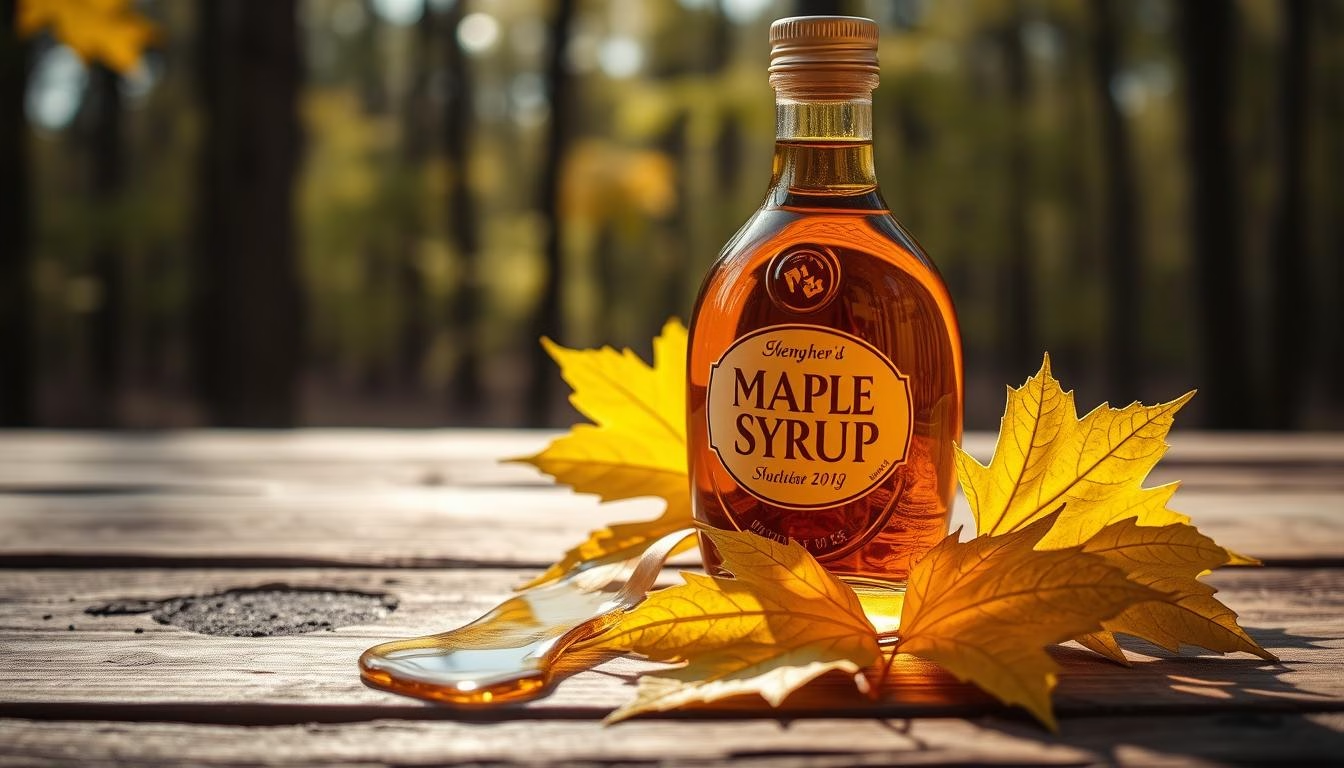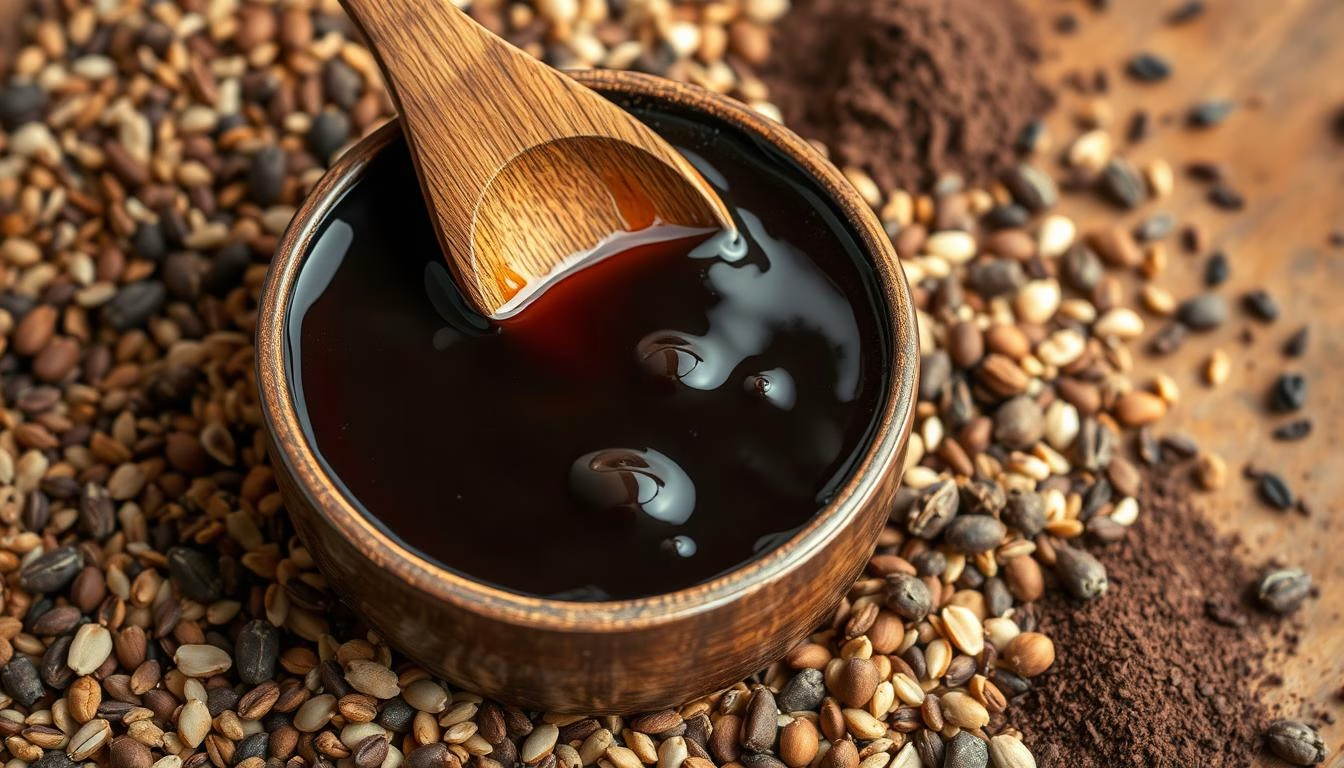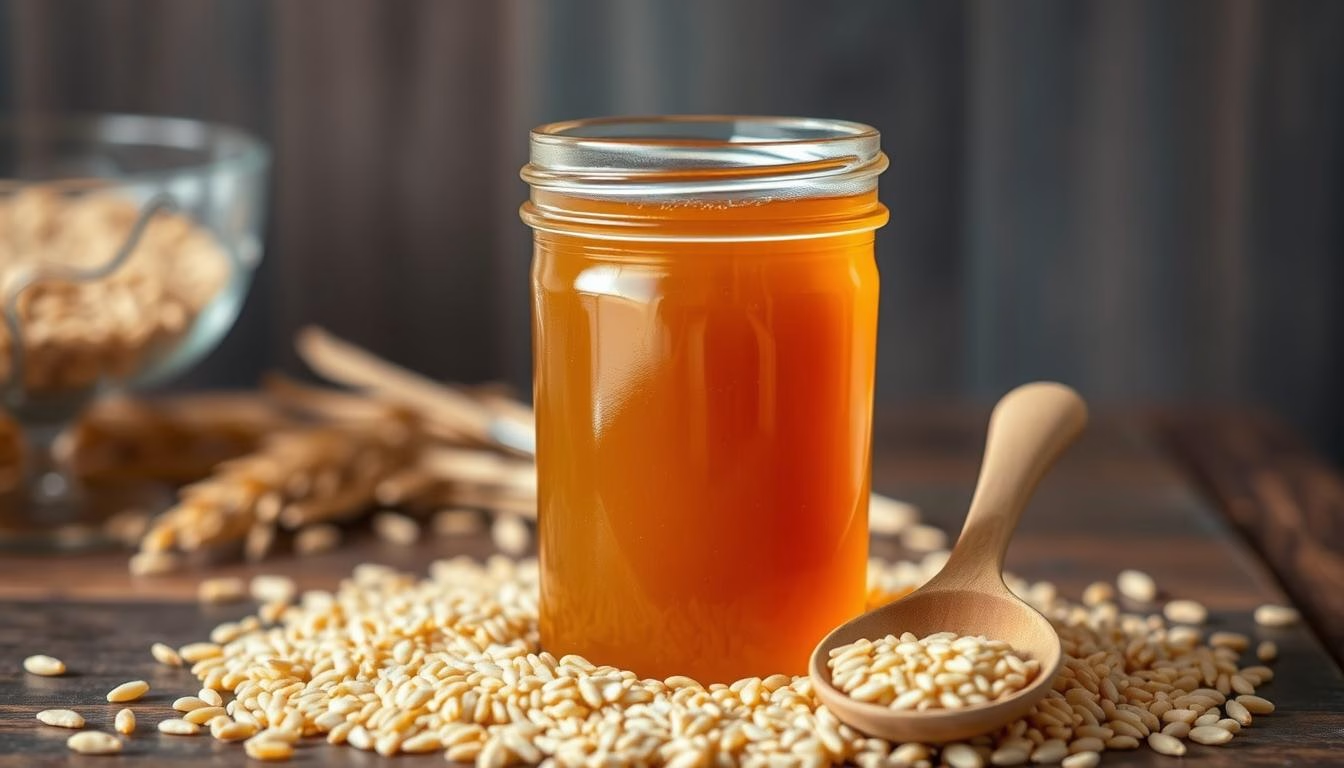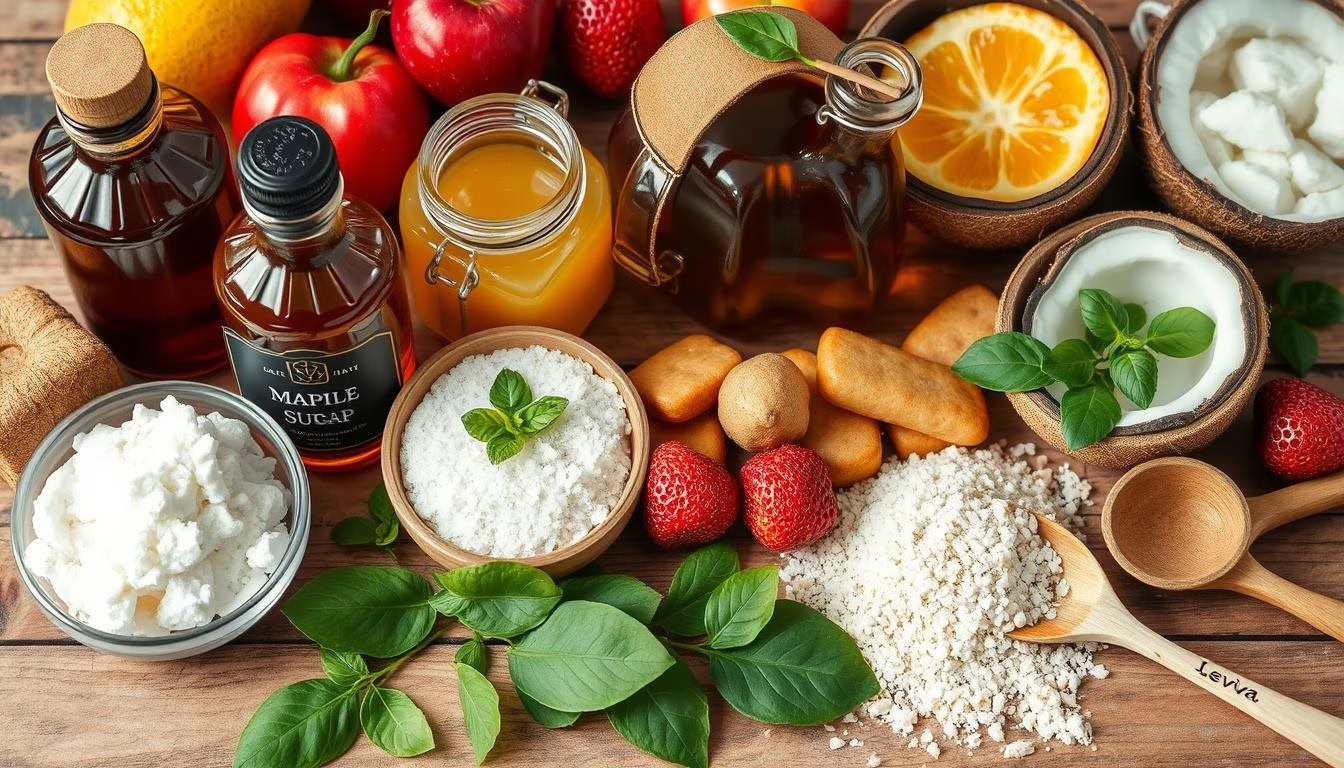Agave nectar has been a favorite among natural sweeteners. But, as we learn more about nutrition, we find new options with special benefits. Let’s look at healthy sweeteners and sugar substitutes that can make your food better.
Agave nectar is known for its low glycemic index, between 10-27. But, it’s high in fructose, which can cause fat storage and liver issues if eaten too much. That’s why we’re introducing you to agave nectar alternatives that are healthier and still sweet.
There’s a wide range of natural sweeteners, like maple syrup and coconut sugar. Stevia and monk fruit are also great options. Each one has its own taste and health perks. For example, honey has enzymes and antioxidants, making it more than just carbs.
We’ll share tips and substitution ratios for using these alternatives in your recipes. Whether you want a direct swap or are open to new tastes, we’ve got you covered.
Key Takeaways
- Agave nectar alternatives offer diverse health benefits and flavor profiles
- Natural sweeteners can have varying effects on blood sugar levels
- Proper substitution ratios are crucial when replacing agave in recipes
- Some alternatives, like coconut nectar, boast a lower glycemic index
- Moderation is key when using any sweetener, natural or otherwise
Understanding Natural Sweeteners: A Comprehensive Overview
Natural sweeteners are becoming more popular as people look for healthier sugar options. These sweeteners come from plants and offer many benefits. They are made from various sources.
What Makes a Sweetener Natural
Natural sweeteners come from plants and are processed less than refined sugar. They often keep some of their original nutrients. Honey, maple syrup, and coconut sugar are examples. These vegan alternatives sweeten without artificial additives.
The Rise of Alternative Sweeteners
More people want low-glycemic sweeteners due to health reasons. They seek options that don’t raise blood sugar levels. Stevia, being 300 times sweeter than sugar, is a zero-calorie choice. Monk fruit extract is also popular for its sweetness without calories.
Health Benefits of Natural Sugar Substitutes
Many natural sweeteners have nutritional benefits. Blackstrap molasses, for example, has iron, B vitamins, and antioxidants. Pure maple syrup helps slow down blood sugar, good for diabetes. Coconut sugar has vitamins and minerals not in white sugar.
| Sweetener | Calories per Tbsp | Glycemic Index | Key Benefits |
|---|---|---|---|
| Honey | 64 | 50 | Antioxidants, enzymes |
| Maple Syrup | 52 | 54 | Minerals, antioxidants |
| Coconut Sugar | 45 | 35 | Vitamins, minerals |
| Stevia | 0 | 0 | Zero calories, no impact on blood sugar |
When picking natural sweeteners, think about their unique qualities and health benefits. Each has its own taste and nutritional value. They can add variety to a healthy diet.
Why Choose Agave Nectar Alternative Options
Agave nectar is seen as a healthy sugar substitute. But, let’s look closer. The truth about agave processing might shock you. You might want to think about agave nectar alternatives for your recipes.
The Truth About Agave Processing
Agave nectar is processed a lot. This process takes away many of its natural benefits. So, it’s not as healthy as it seems.
High Fructose Content Concerns
Agave nectar has a lot of fructose, up to 90%. This is more than high-fructose corn syrup. Too much fructose can harm your liver and metabolism.
Impact on Blood Sugar Levels
Agave nectar has a lower glycemic index than refined sugars. But, it’s not as good for blood sugar as thought. If you’re looking for low-glycemic sugar alternatives or diabetic-friendly sweeteners, there are better choices.
| Sweetener | Substitution Ratio | Glycemic Impact |
|---|---|---|
| Honey | 1:1 | Moderate |
| Maple Syrup | 1:1 | Lower than agave |
| Coconut Nectar | 1:1 | Low |
Considering alternatives to agave nectar is good for your health and cooking. Many options are as sweet but healthier. They’re great for those looking for healthy sugar substitutes.
Honey: Nature’s Golden Sweetener
Honey is a favorite natural sweetener, loved for its taste and health benefits. It has been valued for centuries, not just for its flavor but also for its nutrients.
Raw vs. Processed Honey
Raw honey comes straight from the hive, untouched. It keeps more natural goodness like enzymes, vitamins, and minerals than processed honey. Darker honey has more antioxidants, making it a great choice for health.
Nutritional Benefits and Properties
Honey is full of nutrients and offers health benefits. It has about 40% fructose and 30% glucose, giving a natural energy boost. Honey’s glycemic index is 58, which is lower than sugar but higher than agave nectar.
| Nutrient | Amount per 100g |
|---|---|
| Calories | 300 |
| Fructose | 40% |
| Glucose | 30% |
| Glycemic Index | 58 |
Best Uses in Cooking and Baking
Honey is great in many recipes. Use half a cup of honey for every cup of sugar in baking. Lower the oven temperature by 25°F to avoid over-browning. Honey makes baked goods soft and moist.
“Honey is nature’s perfect food – sweet and wholesome, never spoiling, always waiting to be savored.”
While honey has many benefits, it’s key to follow the American Heart Association’s sugar limits. Women should have no more than 6 teaspoons of added sugars daily, and men should have no more than 9. Also, don’t give honey to babies under one year old because of botulism spores.
Maple Syrup: A Pure Tree-Based Alternative

Maple syrup is a natural sweetener that’s pure and unique. It’s made from trees and offers more than just sweetness. It also has nutrients that make it stand out.
Maple syrup has fewer calories than agave, a common natural sweetener. A tablespoon of maple syrup has 69 calories, while agave has 86. It also has less sugar and carbs. Maple syrup has 16.1 grams of sugar and 17.8 grams of carbs per tablespoon. Agave has 18.8 grams of sugar and 21.1 grams of carbs.
Maple syrup is rich in minerals. Each tablespoon has 27mg of calcium and 0.54mg of manganese. Agave has less calcium and no manganese. These minerals are good for our health.
“Replacing refined sugar with maple syrup improved cardiometabolic health, including reduced abdominal fat and lower systolic blood pressure.”
Maple syrup is better for blood sugar control. It has a glycemic index of 54, which is lower than refined sugar. It also has polyphenols, which fight inflammation. These qualities make maple syrup a healthy syrup substitute in many recipes.
You can use maple syrup as a 1:1 replacement for other sweeteners in cooking and baking. Its strong flavor adds depth to dishes. Try drizzling it over oatmeal, using it in marinades, or in baked goods for a nutritious twist.
Coconut Sugar: The Low-Glycemic Option
Coconut sugar is becoming popular as a low-glycemic sweetener. It’s a paleo-friendly option with a unique taste and health benefits.
Production Process
Coconut sugar is made from coconut palm sap. Farmers tap the trees, collect the sap, and heat it to remove water. This makes a sweetener with a caramel-like taste.
Mineral Content Benefits
Coconut sugar keeps some nutrients from the plant. It has iron, zinc, calcium, and potassium, though in small amounts. These nutrients add to its nutritional value.
Baking Applications
Coconut sugar can replace white sugar 1:1 in baking. Its taste is slightly less sweet, making it easy to adjust recipes. It also adds a caramel flavor to baked goods.
| Property | Coconut Sugar | White Sugar |
|---|---|---|
| Glycemic Index | 35 | 65 |
| Minerals | Contains trace amounts | None |
| Flavor | Caramel-like | Neutral |
| Baking Ratio | 1:1 | 1:1 |
Coconut sugar has a low glycemic index of 35, making it good for blood sugar control. While healthier, it should be used in moderation. For more on healthy choices, see the benefits of coconut yogurt, a dairy-free favorite.
Date Syrup and Date Sugar Alternatives
Date syrup and date sugar are great for those who want natural sweeteners. They come from fruit and add unique tastes and health benefits to your cooking. Let’s see how these alternatives can make your dishes better.
Date sugar is made from whole dates and is full of vitamins, fiber, and minerals. It’s a healthier choice than regular sugar. It’s perfect for baked goods, adding depth and complexity to flavors.
Date syrup is a fruit puree sweetener with a smooth texture and intense sweetness. It’s great for many recipes, like drizzling over pancakes or sweetening smoothies. It adds moisture and richness to baked goods, improving taste and texture.
When using date-based sweeteners, remember their special qualities. Date sugar doesn’t dissolve well in liquids, so it’s best for dry mixes. Date syrup, however, blends well in both hot and cold recipes.
| Sweetener | Best Uses | Substitution Ratio |
|---|---|---|
| Date Sugar | Baked goods, sprinkled on oatmeal | 1:1 for granulated sugar |
| Date Syrup | Smoothies, sauces, glazes | 2/3 cup for 1 cup sugar |
Try these date syrup alternatives in your favorite recipes. They’re natural, sweet, and good for you. They’re perfect for those who want to cut down on refined sugar but still enjoy tasty food.
Stevia: The Zero-Calorie Natural Sweetener
Stevia is a plant-based sweetener that’s zero-calorie. It’s made from Stevia rebaudiana leaves and is much sweeter than sugar. As people look for sugar-free alternatives, stevia is a top pick for cutting calories.
Different Forms Available
Stevia is available in many forms:
- Liquid extracts
- Powdered forms
- Granulated blends
Each form has its own uses. Liquid stevia is great for drinks, and powdered stevia is perfect for baking.
Proper Usage Guidelines
To use stevia well, follow these tips:
- Start with small amounts and adjust to taste
- Use stevia-specific recipes for best results
- Combine with other sweeteners for a balanced flavor profile
Potential Benefits and Drawbacks
Stevia has many benefits as a vegan sweetener:
- Zero calories
- No impact on blood sugar levels
- Suitable for diabetics
But, there are some downsides:
- Potential aftertaste for some users
- Limited effectiveness in certain baking applications
Despite these, stevia is still a favorite for natural sweeteners. Its health benefits and versatility make it great for a balanced diet.
Molasses: The Mineral-Rich Sweetener
Molasses is a unique natural sweetener full of minerals. It’s a dark, syrupy byproduct of sugar refining. It has a rich flavor and offers great nutritional benefits. As a molasses alternative, it adds a special taste to recipes that other sweeteners can’t.
Unlike refined sugar, molasses keeps many nutrients from sugar cane or sugar beets. Blackstrap molasses, the most concentrated form, is especially rich in essential minerals. Let’s take a closer look at its nutritional profile:
| Nutrient | % Daily Value (per ½ cup) |
|---|---|
| Magnesium | 102% |
| Manganese | 129% |
| Potassium | 70% |
| Iron | 44% |
| Calcium | 35% |
This mineral content makes molasses stand out from other natural sweeteners. For those looking for molasses replacements, it’s hard to match this nutritional profile. Molasses sweetener not only adds depth to baked goods but also boosts their nutritional value.

In cooking, molasses shines in recipes like gingerbread, baked beans, and barbecue sauces. Its robust flavor may not suit all dishes, but when used right, it adds a unique, comforting taste. For those exploring natural sweetener options, molasses offers a compelling mix of flavor and nutrition.
Monk Fruit: The Rising Star in Natural Sweeteners
Monk fruit sweetener is becoming more popular as a sugar substitute. It comes from a small melon found in Southeast Asia. This sweetener is very sweet but has no calories like sugar.
Extraction Process
To make monk fruit sweetener, they start by picking ripe fruits. They extract sweet compounds called mogrosides from the fruit. These are then concentrated to make a very sweet extract. This extract is 250-300 times sweeter than sugar.
Health Benefits
Monk fruit sweetener has many health benefits. It has no calories or sugar, making it great for those watching their diet. It also doesn’t raise blood sugar levels. This is good for people with diabetes or those on low-carb diets.
Culinary Applications
Monk fruit sweetener can be used in many dishes. It’s good in drinks, baked goods, and as a sweetener at the table. Because it’s so sweet, you only need a little. Some brands mix it with other sweeteners to make it easier to use in recipes.
The market for sugar substitutes, like monk fruit, is growing quickly. It’s expected to hit $21.82 billion by 2032. This shows more people want vegan and natural sweeteners instead of sugar.
Brown Rice Syrup: A Complex Carbohydrate Option

Brown rice syrup is a special natural sweetener made from brown rice. It has a mild, nutty taste that’s different from other sweeteners. It’s also less sweet than sugar, making it good for those trying to eat less sugar.
This sweetener is made by fermenting brown rice. This process gives it a darker color and a milder taste. It’s rich in complex carbohydrates but high in calories. It can also raise blood sugar levels a lot.
When you use brown rice syrup in recipes, remember its special qualities:
- Use 1.5 tablespoons of brown rice syrup for every 1 tablespoon of agave nectar
- Adjust other liquids in recipes, as brown rice syrup has a higher moisture content
- Consider its milder sweetness when substituting for other sweeteners
Brown rice syrup is great in many dishes. Its subtle sweetness is perfect for baking. It’s also good in sauces and as a binder in granola bars or energy bites.
Even though brown rice syrup is a unique alternative to traditional sweeteners, use it carefully. It’s high in calories and can affect blood sugar levels. So, it’s best to eat it in small amounts, especially if you’re watching your sugar intake.
Yacon Syrup: The Prebiotic Sweetener
Yacon syrup is becoming more popular as a natural sweetener. It’s made from the yacon root, found in South America. Its special properties make it a standout among natural sweeteners.
Source and Production
The yacon plant grows well in the Andes mountains. Farmers get juice from the roots and turn it into syrup. This method keeps yacon’s good stuff, like fructooligosaccharides (FOS), intact.
Digestive Health Benefits
Yacon syrup is great for your gut. The FOS in it feeds good bacteria, helping your digestion. It’s also good for weight management and controlling blood sugar.
Usage Guidelines
To use yacon syrup in your cooking:
- Start with small amounts, as it’s sweeter than sugar
- Use it in beverages, baked goods, and as a topping
- Store in a cool, dry place after opening
- Avoid heating yacon syrup to high temperatures to preserve its benefits
Yacon syrup is a tasty way to sweeten your food and support your gut health. Its low glycemic index is great for those watching their blood sugar. Start with small amounts to enjoy its unique benefits.
Sugar Alcohols: Understanding Erythritol and Xylitol
Sugar alcohols, like erythritol and xylitol, are becoming more popular as low-calorie sweeteners. They offer a sweet taste without the calories of regular sugar. Erythritol, found in fruits and fermented foods, has about 6% of sugar’s calories. Xylitol, made from birch trees and corn cobs, has about 40% fewer calories than sugar.
Both erythritol and xylitol have little effect on blood sugar levels. This makes them good for people with diabetes. They also don’t cause tooth decay, unlike regular sugar. The science behind sweetness shows they work differently with our taste receptors. This provides sweetness without the health drawbacks.
However, sugar alcohols have some downsides. Some people may feel digestive discomfort from eating too much. It’s best to slowly add these sweeteners to your diet. Erythritol is often easier to digest than xylitol.
When using these alternatives in cooking or baking, remember they don’t brown or texture like sugar. You might need to adjust your recipes.
FAQ
What are the best agave nectar alternatives for people with diabetes?
For those with diabetes, good alternatives to agave nectar are stevia, monk fruit sweetener, and erythritol. These sweeteners don’t raise blood sugar much. Yacon syrup and coconut sugar are also good, as they have a lower glycemic index than regular sugar.
How does maple syrup compare to agave nectar in terms of nutritional value?
Maple syrup is more nutritious than agave nectar. It has more minerals like manganese, zinc, and potassium, and antioxidants. Maple syrup has less fructose and a slightly lower glycemic index, making it better for most people.
Can I use honey as a one-to-one replacement for agave nectar in recipes?
You can often use honey instead of agave nectar in recipes. But honey tastes different and is less sweet. You might need to adjust the amount used. Also, honey makes baked goods more moist, so you might need to reduce liquid.
What is the best natural sweetener for baking?
The best natural sweetener for baking varies by need. Coconut sugar is a top choice because it’s similar to brown sugar. Maple syrup and honey are also good, but you might need to adjust liquid content. For low-calorie baking, try stevia or monk fruit sweetener, but you might need to experiment.
Are natural sweeteners healthier than refined sugar?
Natural sweeteners are often more nutritious than refined sugar. They have antioxidants and minerals. But, they’re still high in calories and can affect blood sugar. Stevia and monk fruit sweetener are calorie-free and don’t raise blood sugar, making them healthier choices.
How does date syrup compare to other natural sweeteners?
Date syrup is packed with nutrients like fiber, potassium, and antioxidants. It has a lower glycemic index than table sugar and agave nectar. It’s rich and complex, making it great for both sweet and savory dishes.
What are the benefits of using yacon syrup as a sweetener?
Yacon syrup is low in calories and has a low glycemic index. It’s good for those watching their calorie intake or blood sugar. It’s also a prebiotic, supporting gut health. But, it’s not as sweet as sugar, so it might not work for all recipes.
Are there any side effects to using sugar alcohols like erythritol and xylitol?
Sugar alcohols like erythritol and xylitol are usually safe but can upset some stomachs. They might cause bloating, gas, and diarrhea, especially in large amounts. Erythritol is often better tolerated than xylitol. But, xylitol is toxic to dogs, so keep it away from pets.


